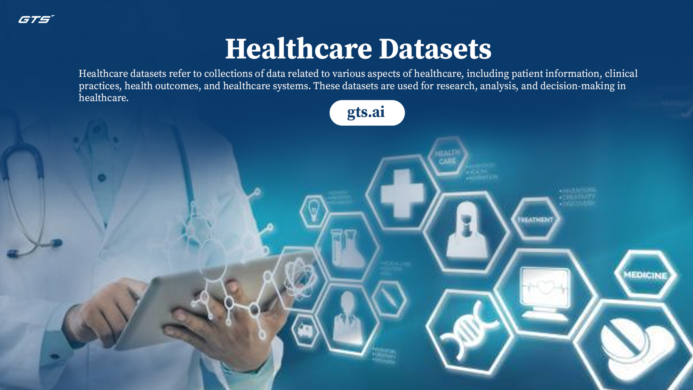
blog address: https://gts.ai/industries/healthcare/
blog details: In today’s rapidly advancing digital world, healthcare is undergoing a profound transformation, driven in large part by the use of healthcare datasets. These datasets are invaluable resources that provide critical insights into patient care, medical research, and healthcare system efficiency. As the volume of healthcare data continues to grow exponentially, organizations and researchers are harnessing this information to improve patient outcomes, streamline operations, and foster innovation in medical treatments.
What Are Healthcare Datasets?
Healthcare datasets are collections of data related to patient health, clinical activities, medical research, hospital operations, and public health information. These datasets can include a wide range of data types, such as:
Electronic Health Records (EHRs): Digital versions of patients' medical histories, including diagnoses, medications, treatment plans, immunization dates, allergies, radiology images, and laboratory test results.
Clinical Trial Data: Information collected during clinical trials, including patient demographics, treatment regimens, and outcomes.
Genomic Data: Genetic information that helps in understanding the hereditary aspects of diseases and the development of personalized medicine.
Administrative Data: Data related to hospital operations, insurance claims, and patient billing, providing insights into the efficiency and financial aspects of healthcare.
Public Health Data: Large-scale population health data used for monitoring disease trends, predicting outbreaks, and informing public health policies.
Applications of Healthcare Datasets
Improving Patient Care One of the primary uses of healthcare datasets is enhancing patient care. By analyzing data from EHRs, healthcare providers can identify patterns and trends that inform better treatment decisions. For instance, healthcare datasets can help predict which patients are at higher risk of developing chronic conditions, allowing for early intervention and preventive measures.
Additionally, real-time data can be used in predictive analytics to alert doctors to potential complications in patients, enabling timely treatment. The integration of healthcare datasets across multiple platforms also ensures that healthcare providers have access to comprehensive patient information, leading to more personalized and accurate care.
Accelerating Medical Research Medical researchers rely heavily on healthcare datasets to conduct studies that lead to new treatments and medical breakthroughs. By analyzing large datasets from clinical trials or genomic studies, researchers can discover correlations and causalities that may not be evident through traditional research methods. This has paved the way for innovations in precision medicine, where treatments are tailored to the genetic makeup of individual patients.
Furthermore, with the advent of big data analytics and artificial intelligence (AI), researchers can process and analyze vast amounts of healthcare data at unprecedented speeds. This capability accelerates the development of new drugs, therapies, and diagnostic tools.
Optimizing Healthcare Operations Healthcare datasets are also crucial in optimizing the operational aspects of hospitals and healthcare systems. By analyzing administrative data, hospitals can identify inefficiencies in patient flow, staff utilization, and resource allocation. For example, predictive models can be used to forecast patient admissions, allowing hospitals to better manage bed availability and staffing needs.
Additionally, insurance companies use healthcare datasets to detect fraudulent claims, assess the cost-effectiveness of treatments, and design more accurate pricing models for healthcare plans.
Enhancing Public Health Initiatives Public health organizations use large-scale healthcare datasets to monitor the spread of diseases, predict outbreaks, and develop strategies for disease prevention and control. For example, during the COVID-19 pandemic, healthcare datasets were instrumental in tracking infection rates, understanding the impact of the virus on different populations, and informing vaccination strategies.
These datasets also help policymakers make evidence-based decisions that can improve population health outcomes. By analyzing trends in chronic diseases like diabetes or heart disease, public health authorities can design targeted intervention programs to reduce the burden of these conditions on society.
Challenges in Using Healthcare Datasets
Despite their immense potential, the use of healthcare datasets comes with several challenges. One of the most significant issues is data privacy and security. Healthcare data is highly sensitive, and organizations must ensure that they comply with regulations like HIPAA (Health Insurance Portability and Accountability Act) to protect patient confidentiality. Unauthorized access to healthcare data can lead to breaches of patient privacy, identity theft, and other harmful consequences.
Another challenge is the lack of standardization across different datasets. Healthcare organizations often use different systems and formats for data collection, making it difficult to integrate and analyze data from multiple sources. This lack of interoperability can limit the effectiveness of big data analytics in healthcare.
Lastly, there is the issue of data quality. Inaccurate or incomplete data can lead to faulty conclusions and poor decision-making. Ensuring that healthcare datasets are accurate, up-to-date, and comprehensive is essential for deriving meaningful insights.
Conclusion
Healthcare datasets are a powerful tool in the ongoing effort to improve patient care, advance medical research, optimize healthcare operations, and enhance public health initiatives. As technology continues to evolve, the potential applications of these datasets will only expand, offering even greater opportunities for innovation in the medical industry. However, addressing the challenges of data privacy, standardization, and quality will be critical to unlocking the full value of healthcare datasets and ensuring that they are used effectively and ethically.
keywords: data collection company
member since: Oct 21, 2024 | Viewed: 8


